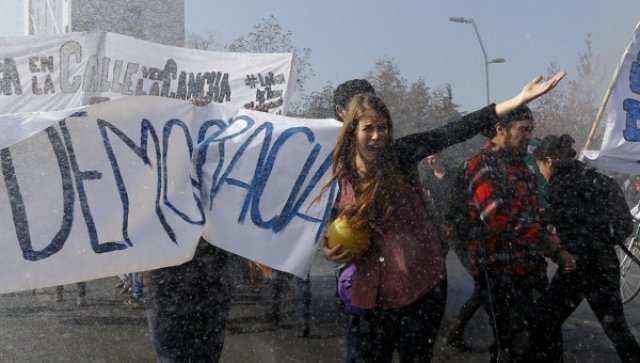
Chilean teachers strike against education bill
Thousands of Chilean teachers took to the streets of Santiago once again on June 17, TeleSUR English said that day.
The protest was part of the indefinite national strike to protest against an education reform bill proposed by the government of President Michelle Bachelet. There were marches in at least five other cities across the country.
The bill, being debated in Congress, proposes reorganising the salary scale for teachers while increasing the time they work in “non-school hours”. Teachers who do not follow these new rules would be sacked.
Colombia: Ceasefire call as peace talks resume
Peace talks held in Cuba between the Colombian government and the Revolutionary Armed Forces of Colombia (FARC) resumed on June 17. It came amid a decision by Colombian President Juan Manuel Santos to intensify military attacks on guerrilla groups, TeleSUR Engish said that day.
Colombia has been wracked by decades of armed conflict as the FARC and other rebel groups have fought successive oligarch-backed regimes, which were often strongly assisted by the United States.
FARC delegates opened the 38th round of peace talks in Havana by calling for a de-escalation of the conflict to avoid more bloodshed. In a statement, the FARC said: “We call on contradictions to be put aside, to try to make an agreement that will stop the conflict immediately, without waiting for the signing of a final agreement.”
Santos has insisted that a bilateral cease-fire can only be implemented once a final agreement has been reached. That position has led to a conflict between the rebels and government security forces, which have ramped-up the armed actions in recent months despite progress at the negotiation table.
Dominican Republic deportations 'state-sponserod open season'
Acclaimed Haitian-American novelist Edwidge Danticat has lashed out a mass deportations of Haitians in the Dominican Republic as “state-sponsored open season”, TeleSUR English said on June 17.
Half-a-million legally stateless Haitians are at risk of deportation, including those who were not even born in Haiti, after a court ruling two years ago said Haitian migrants dating back as far as 1929 could be stripped of their citizenship.
Danticat, whose latest novel is called Claire of the Sea Light, told Democracy Now! that the law made Haitians vulnerable to deportation and to violent attacks.
“This law not only now gives the Dominican government the power to deport mass amounts of people, but also creates an environment, a civil environment, that’s really hard for people, because, you know, others might feel now that we’ve had an increase of violence against Haitians and Dominicans of Haitian descent, because it seems like a state-sponsored open season on people who are considered Haitians by the way they look, primarily, or by their Haitian-sounding name.”
On June 15, Haitians and Dominicans protested outside the Dominican consulate in New York, holding signs with slogans such as “Say No to Racist Violence” and “Ethnic Cleansing”.
Guatemala: Students join wave of anti-gov't protests
Social protests continued in Guatemala City on June 17, TeleSUR English said that day, as students took to the streets to demonstrate against President Otto Perez Molina and the catalogue of corruption cases against the government.
Raisa Morales, an artist involved in the protest, said: “We want [Perez Molina’s administration] to pay … If a business was like this, it would quickly fire them.
“But we don’t have the power to fire anybody, so we are demanding the power, like the powerful in this country, to fire those who are not working for our country.”
The students used the demonstration to hand out surveys to gauge popular views on whether the system is corrupt and whether removing Molina could resolve the crisis.
Protest participant Wendy Hernandez said, “We have to do everything ourselves if we want to change what we see in this country day to day.”
Perez Molina was ordered to appear before Congress on June 18 to face questioning over his alleged role in a US$14 million corruption scandal that has angered the nation. The Central American country has been awash in corruption scandals in recent months, including multimillion dollar dealings with the Guatemalan social security and tax collection agencies.
Like the article? Subscribe to Green Left now! You can also like us on Facebook and follow us on Twitter.